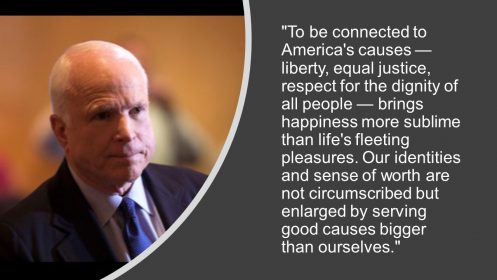Related Posts
Transcendent power of last messages

Flags fly at half-mast around the US Capitol in honor of Senator John McCain. Photo courtesy of AFP / Brendan Smialowski.
In September 2007, people in academia and beyond were moved by the last lecture of Dr. Randy Pausch, Carnegie Mellon University professor of computer science, human-computer interaction and design. Knowing he was suffering from incurable pancreatic cancer, Pausch wanted to leave students and colleagues with last words about life from someone facing the inevitability of death. He died less than a year later, in July 2008. Other individuals since have presented last lectures, and class exercises have assigned students to write their own. It is powerful to consider one’s mortality and legacy, whatever we may think about afterlife.
Value of Senator McCain’s voice
On Monday, a family spokesman read Senator John McCain’s last message to the country. The senator had passed away over the weekend. I admired Senator McCain, although I did not agree with all his positions or votes. As he said about himself, he’d made mistakes, but he owned them. His was a voice badly needed in politics today. He had courage, a moral center, intense love for his country and the rule of law; he was willing to take tough stands even when it meant losing friends and allies.
Particularly moving was his monumental vote that kept the Affordable Care Act (ACA) from becoming history. He upset his party and president, but he did the right thing for the millions of people who would have been uninsured had the ACA been repealed. Some likely would have died as a result. The action to repeal would have been taken by lawmakers who have some of the best health insurance in the country.
In writing his last message, John McCain appealed to the better people we can be if we put our minds to it. That’s a message we all need to hear. We are better when we come together to solve problems. We need more messages such as his from people who can drive effective solutions without rancor and bitterness. McCain’s message is relevant and powerful for people in public health who are drawn to good causes bigger than themselves. We are motivated every day to get up and serve those causes.
Intentionally building meaningful lives
I have thought about the power of last messages and actions, and how they can help us continue to achieve impact and realize our values and dreams after death. In writing wills, my husband and I considered how we could direct our resources to act on our values, e.g., an endowed scholarship at the Gillings School, especially for underserved students, named for my parents. (I had the joy of seeing the pleasure it brought them.)
If we put our time, intellect, energy and resources (however large or small) into efforts that have meaning, value and impact, we can create legacies that matter and live on. I imagine that’s what Senator McCain intended with his last letter to the country, in which he set for us all a higher-order agenda, a moral call to action and equity, decency and honor.
What do we do with the short time we have on earth? How do we enact our values? Senator McCain seems to have lived, on balance, a good life – not a perfect life (who does?), but a life of value, meaning and, as he described, one filled with joy and love of family, land and country.
I’m thinking about writing a letter modeled after McCain’s at the end of each year. Just as Randy Pausch’s last lecture became a model for other such lectures delivered by faculty members not facing imminent death, Senator McCain’s letter could be a model for how to achieve our desire for meaningful lives, lived with intention and having lasting impact.
Barbara
The views expressed in this blog are Barbara Rimer’s alone and do not represent the views and policies of The University of North Carolina or the Gillings School.

